Projektinformation auf Deutsch
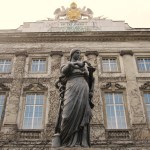 Music, Medicine, and Psychiatry in Vienna
Music, Medicine, and Psychiatry in Vienna
(c. 1780 – c. 1850)
Andrea Korenjak (Principal Investigator)
Austrian Academy of Sciences, Institute of the History of Art and Musicology,
sponsored by the Austrian Science Fund (FWF)
Fig.: Josephinum, photograph by Andrea Korenjak
(Neue Zeitschrift für Musik № 26, March 29, 1847, p. 112)
The aim of the project is to provide the hitherto missing hist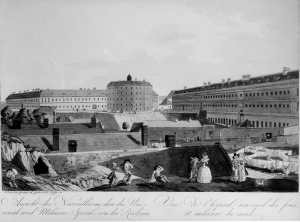 orical description, contextualization, and analysis of the use of music in medicine and in psychiatric institutions of the late 18th and the first half of the 19th century in Vienna. Embedded in the broader international context (above all psychiatric reforms in France, Germany, and England) and the national context (psychiatric institutions of the Habsburg Empire/Austrian Empire) the study focuses on two Viennese institutions in particular (k. k. Irren-Antstalt, Privat-Heilanstalt für Gemüthskranke Dr. Goergen), which to date have not been investigated from a music-historical perspective. In addition to primary literature, the underlying body of historical source material of this project has been enhanced by archival research, such as in the Wiener Stadt- und Landesarchiv and the Josephinum.
orical description, contextualization, and analysis of the use of music in medicine and in psychiatric institutions of the late 18th and the first half of the 19th century in Vienna. Embedded in the broader international context (above all psychiatric reforms in France, Germany, and England) and the national context (psychiatric institutions of the Habsburg Empire/Austrian Empire) the study focuses on two Viennese institutions in particular (k. k. Irren-Antstalt, Privat-Heilanstalt für Gemüthskranke Dr. Goergen), which to date have not been investigated from a music-historical perspective. In addition to primary literature, the underlying body of historical source material of this project has been enhanced by archival research, such as in the Wiener Stadt- und Landesarchiv and the Josephinum.
Fig. 1: General Hospital and Narrenthurm [“Fool’s Tower“] (1781). By courtesy of the Austrian National Library, item number: BDA 1.226 – C
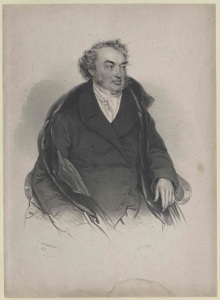 The project offers a synopsis of the cultural, socio-political, medical, and psychiatric conditions in Viennese history which influenced “therapeutic” ideas on the use of music at that time (c. 1780 – c. 1850): The ideals of neohumanism (e.g. humanity, moral education, Bildung in the sense of studia humanitatis) and of Enlightenment (e.g. respect for the individual, freedom, and equality), reforms of Joseph II, the emergence of “modern” psychiatry, theories on “mental illness” (“somatic”/“brain anatomical” as well as “psychic” concepts of “mental illness”), theories of music’s effects on the body/nerves and on the soul/Gemüth, reflected both in the medical and music-aesthetic discourse, etc. In this context, the 18th and 19th century physical and musical concepts of Resonanz, meaning both “acoustic resonance” and “response” (“inner movement”), Stimmung, meaning both “tune” and “mood”, and Sympathie, meaning both “resonance” and “affection”, have been examined in detail. Additionally, the project – which is especially obliged to the discipline of Historical Musicology – considers the musical aesthetics discourse of this period.
The project offers a synopsis of the cultural, socio-political, medical, and psychiatric conditions in Viennese history which influenced “therapeutic” ideas on the use of music at that time (c. 1780 – c. 1850): The ideals of neohumanism (e.g. humanity, moral education, Bildung in the sense of studia humanitatis) and of Enlightenment (e.g. respect for the individual, freedom, and equality), reforms of Joseph II, the emergence of “modern” psychiatry, theories on “mental illness” (“somatic”/“brain anatomical” as well as “psychic” concepts of “mental illness”), theories of music’s effects on the body/nerves and on the soul/Gemüth, reflected both in the medical and music-aesthetic discourse, etc. In this context, the 18th and 19th century physical and musical concepts of Resonanz, meaning both “acoustic resonance” and “response” (“inner movement”), Stimmung, meaning both “tune” and “mood”, and Sympathie, meaning both “resonance” and “affection”, have been examined in detail. Additionally, the project – which is especially obliged to the discipline of Historical Musicology – considers the musical aesthetics discourse of this period.
Fig. 2: One of the most important proponents for the use of music in psychiatric institutions in Vienna was Bruno Goergen (1777–1842). By courtesy of the Austrian National Library, item number: PORT_00004311_01
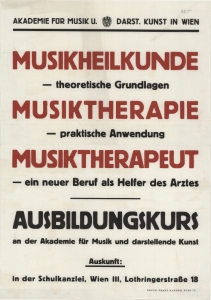 The project fills both a historical and a trans-disiplinary gap in scholarship and can be seen as the first part of the history of “Viennese Music Therapy” (c. 1780 – c. 1850) before its modern beginnings in 1958. A follow-on project concerning the second half of the 19th century to 1938 is planned. Hence, this project forms the foundation for future historical research. Furthermore, the study is also relevant to 18th and 19th century Austrian studies and its intellectual history including the history of musicology, psychiatry, and medicine. The results, which will be published in articles and in the form of a monograph, will be essential for any further historical investigation on “Viennese Music Therapy” in particular, and the history of Western “music therapy” in general. In an exchange with international and national cooperation partners [see below] the project intends to initiate a dialog between the disciplines of Historical Musicology, history of medicine and psychiatry, and music therapy.
The project fills both a historical and a trans-disiplinary gap in scholarship and can be seen as the first part of the history of “Viennese Music Therapy” (c. 1780 – c. 1850) before its modern beginnings in 1958. A follow-on project concerning the second half of the 19th century to 1938 is planned. Hence, this project forms the foundation for future historical research. Furthermore, the study is also relevant to 18th and 19th century Austrian studies and its intellectual history including the history of musicology, psychiatry, and medicine. The results, which will be published in articles and in the form of a monograph, will be essential for any further historical investigation on “Viennese Music Therapy” in particular, and the history of Western “music therapy” in general. In an exchange with international and national cooperation partners [see below] the project intends to initiate a dialog between the disciplines of Historical Musicology, history of medicine and psychiatry, and music therapy.
Fig. 3: Advertisement in 1965: MUSIC-MEDICINE – theoretical principles, MUSIC THERAPY – practical application, MUSIC THERAPIST – a new profession as an assistant of the physician, TRAINING COURSE at the Academy of Music and Performing Arts. By courtesy of the Austrian National Library, item number: PLA16650093
Project video:
The beginnings of Viennese music therapy
Press reports:
- March 3, 2018: Report on the FWF-Project “Music, Medicine, and Psychiatry in Vienna (c. 1780-1850)” in Die Presse
Historische Spuren der Musiktherapie in Wien
- December 22, 2016: Project related interview with Sylvia Maier-Kubala (APA Science): “On the Beginnings of Music Therapy in Viennese ‘Lunatic Asylums'”
Von den Anfängen der Musiktherapie in Wiens “Irrenanstalten” APA Science
News and upcoming events:
- April 27, 2018: Paper “Music, Medicine and Psychiatry in Vienna (c. 1780-1850)” at the Panel for the History of Medicine (Austrian Academy of Sciences) at the Josephinium
Commission for the History and Philosophy of Sciences
- April 16, 2018: Guest lecure “Music, Medicine and Therapy in the Viennese Context of the 19th Century“ at the University of Augsburg, Department for Music Therapy
Flyer guest lecture at the University of Augsburg
- December 21, 2016: Research grant, awarded by the Austrian National Bank, for the project “Music, Ethos and Medicine: Interrelations and Cultural Transfer in Antiquity and the Middle Ages” (The project starts in Autumn 2017)
Jubiläumsfonds der Österreichischen Nationalbank
- December 22, 2016: Interview with Sylvia Maier-Kubala (APA Science): “Beginnings of Music Therapy in Viennese ‘Madhouses'” [“Von den Anfängen der Musiktherapie in Wiens ‘Irrenanstalten'”] (Interview on the FWF-Project)
Von den Anfängen der Musiktherapie in Wiens “Irrenanstalten” APA Science
- November 10-12, 2016: Visitor and Cooperation meeting with Prof. Peregrine Horden at All Souls College, Oxford University
All Souls College Oxford
- October 19, 2016: Seminar “Pathological versus Aesthetic Listening: From a Philosophical, Medical and Psychiatric Perspective around 1850”. Queen Mary University of London, Centre for the History of the Emotions
Abstract
- October/November 2016: Andrea Korenjak is “Visiting Scholar” at the “Centre for the History of the Emotions”, headed by Professor Dr Thomas Dixon at Queen Mary Univeristy of London
Centre for the History of the Emotions
- June 4, 2016: Paper “Musical Humanism in Medical Writings and Psychiatric Practices in 19th Century Vienna” at the congress “The Musical Humanism of the Renaissance and its Legacy”, Palazzo Pesaro Papafara (Warwick University), Venice (organized by Dr. Jacomien Prins)
Conference Website
Abstracts
- May 27, 2016: Co-Organization of the conference “Music, Medicine and Emotions in History” at the “Centre for the History of the Emotions”, Queen Mary University of London, in cooperation with the FWF-project [P 27287]. (Organization together with Dr. Helen Stark und Dr. Marie Louise Herzfeld-Schild)
Conference Website and Program (Abstracts will follow soon)
Speakers: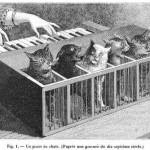
Thomas Dixon (Queen Mary University of London, head of the “Centre for the History of the Emotions”)
Penelope Gouk (University of Manchester)
Peregrine Horden (Oxford University)
James Kennaway (Newcastle University)
David Trippett (Cambridge University)
Wiebke Thormählen (Royal College of Music London)
Una McIlvenna (University of Kent)
Morag Josephine Grant (Leuphana University Lüneburg)
Marie Louise Herzfeld-Schild (University of Cologne)
Andrea Korenjak (Austrian Academy of Sciences)
Fig.: “Cat-piano” from La Nature (1883). By courtesy of the The Bibliothèque centrale du Conservatoire national des arts et métiers
The symposium aims to bring together researchers working at the intersection of music, medicine and emotional wellbeing in history and will be followed by a ballad singing workshop which we hope all delegates will attend and which will be open to the public as part of the QMUL Community Festival.
The Queen Mary Centre for the History of the Emotions, launched in November 2008, is the first research centre in the UK dedicated to the history of the emotions. One of its key objectives is to provide a focus for interactions between social and cultural historians of the emotions on the one hand, and historians of science and medicine on the other. It also seeks to contribute both to policy debates and to popular understandings of all aspects of the history of emotions.
Location: The Mile End campus of Queen Mary is located in East London, less than five minutes walk from Mile End tube station which is on the Central, Hammersmith and City and District lines. When you arrive at Queen Mary, from Mile End enter through the East Gate (the road is Westfield Way), turn left, walk past the cemetery and Arts Two is on the left hand side. On this campus map Arts Two is building 35 and coloured purple.
- April 2016: The research group “History of Medicine”, Committee for the History and Philosophy of Sciences (Austrian Academy of Sciences), is new cooperation partner of the project
Committee for the History and Philsophy of Sciences
- February 2016: Dr. Jacomien Prins, Warwick University, is new cooperation partner of the project
Jacomien Prins
- The “Centre for the History of the Emotions”, Queen Mary University of London, headed by Thomas Dixon, is now a cooperation partner of the project
Centre for the History of the Emotions
Thomas Dixon
- January 28, 2016: Lecture “Introduction to the History of Psychiatry”, Paris-Lodron-University Salzburg, 5:00-6:00 pm, Auditorium Maximum (in German)
- January 14, 2016: Lecture on “Music therapy”, Paris-Lodron-University Salzburg, 3:00-4:30 pm, HS 424 (in German)
- September 25-27, 2015: Cooperation meeting with Peregrine Horden (London/Oxford) in Vienna
- September 10, 2015: Paper “‘…how, and why such musical performances effect the mentally ill [Gemüthskranke] beneficially’ (Bruno Goergen, 1820): Music and Psychiatry in the First Half of the 19th Century in Vienna”” at the joint Conference of the “Society for Cultural Psychology” and the “Research Group for the History of Psychology” at Paris-Lodron-University Salzburg, organized by Prof. Dr. Christian Allesch
Conference Website “Cultural Dynamics and Developments in Psychology”
Conference Program
- September 10, 2015: Cooperation meeting with Prof. Manuela Schwartz (Magdeburg-Stendal) in Salzburg
- July 9, 2015: Paper “Music, Health, and Humanities: Origins of Music Therapy in Vienna” at the conference of the “European Society for the History of the Human Sciences”, Université d’Angers, France
Conference Program
Université d’Angers
- June/July 2015: Organisation of the academic study group “Music and Psychiatry in the Period of Biedermeier” in cooperation with Prof. Dr. Manuela Schwartz and Prof. Dr. Cheryce von Xylander. The presentation of this study group including three individual papers will take place at the conference of the “Society for Cultural Psychology” & “Research Group for the History of Psychology” in Salzburg, September 10, 2015
- June 5, 2015: “Music, the Soul, and the Senses as Exemplified by first half 19th Century Viennese Medical Dissertations” at the Conference “Hearing the Voice, Hearing the Soul”, University of Warwick, organized by Jacomien Prins
Conference Program
Abstracts
- June 2015: Cooperation meeting with Peregrine Horden and Penelope Gouk at Warwick University
- May 2015: Project is part of the “Madness Studies Network”, initiated by Petteri Pietikäinen
Madness Studies Research Network
- May 12, 2015: Talk on “Music, Healing, and Religion: Historical Dimensions of Music Therapy, as Examplified by the Biblical Story of King Saul and David” [in German] at the Catholic Academy of Vienna, organized by Dr. Elisabeth Maier
Catholic Academy of Vienna
- March 2015: Project related proposal for pupils at “Young Science” (Austrian Agency for International Cooperation in Education and Research)
Young Science
Proposal
- March 2015: Cooperation meeting with Penelope Gouk (Manchester) in Vienna
- December 2014: Cardinal Innitzer-Promotional Award in the category of humanities for the study “Music, Healing, and Culture”
Cardinal Innitzer Fund
- October 2014: Interview (“Ö1-Radiokolleg”) “Tarantella: A Folk Dance from Southern Italy. Trance, Therapy, and Tradition”, presented by Anna Masoner
Ö1 Radiokolleg Tarantella
- August 2014: Beginning of the project at the Austrian Academy of Sciences
- June 2014: Approval of the present project [P 27287-G21] by the Austrian Science Fund (FWF)
FWF Project Finder
Project related presentations:
- April 27, 2018: Paper “Music, Medicine and Psychiatry in Vienna (c. 1780-1850)” at the Panel for the History of Medicine (Austrian Academy of Sciences) at the Josephinium
- April 16, 2018: Guest lecure “Music, Medicine and Therapy in the Viennese Context of the 19th Century“ at the University of Augsburg, Department for Music Therapy
- October 19, 2016: Seminar “Pathological versus Aesthetic Listening: From a Philosophical, Medical and Psychiatric Perspective around 1850” at the Centre for the History of the Emotions, Queen Mary University, London
- September 30, 2016: Paper Paper “Hanslick’s Music Aesthetic Discourse in the Context of Medicine and Psychiatry around 1850” at the international conference “Hanslick in Context”, Austrian Academy of Sciences, Austrian Society of Music
- June 4, 2016: Paper “Musical Humanism in Medical Writings and Psychiatric Practices in 19th Century Vienna” at the international congress Congress “The Musical Humanism of the Renaissance and its Legacy”, Palazzo Pesaro Papafara, Venice; University of Warwick
- May 27, 2016: Paper “Music for the Restless Soul in 19th-Century Viennese Psychiatry” at the international conference “Music, Medicine and Emotions in History”, Queen Mary University of London
- January 14 2016: Course “Music Therapy”, Paris-Lodron-University of Salzburg
- September 10, 2015: Presentation of the international study group “Music and Psychiatry in the Biedermeier/Vormärz Period”, together with Prof. Manuela Schwartz and Prof. Cheryce von Xylander
Conference Website “Cultural Dynamics and Developments in Psychology”
Conference Program
- September 10, 2015: Paper “‘…how, and why such musical performances effect the mentally ill [Gemüthskranke] beneficially’ (Bruno Goergen, 1820): Music and Psychiatry in the First Half of the 19th Century in Vienna”” at the joint Conference of the “Society for Cultural Psychology” and the “Research Group for the History of Psychology” at Paris-Lodron-University Salzburg, organized by Prof. Dr. Christian Allesch
Conference Website “Cultural Dynamics and Developments in Psychology”
Conference Program
- July 9, 2015: Paper “Music, Health, and Humanities: Origins of Music Therapy in Vienna” at the conference of the “European Society for the History of the Human Sciences”, Université d’Angers, France
Conference Program
- June 5, 2015: Paper “Music, the Soul, and the Senses as Exemplified by first half 19th Century Viennese Medical Dissertations”, Conference “Hearing the Voice, Hearing the Soul”, University of Warwick (UK)
Conference Program
Abstracts
- May 12, 2015: Paper “Music – Healing – Religion. Historical Dimensions of Music Therapy, as Examplified by the Biblical Story of King Saul and David” [in German] at the Catholic Academy of Vienna, organized by Dr. Elisabeth Maier
Catholic Academy of Vienna
- June 2014: Paper “Music as Treatment for the ‘Illness of the Gemüth’ in Viennese 19th Century Mental Institutions”, Queen Mary University London, International Conference “Music, Emotions, and Well-Being: Historical and Scientific Perspectives” (organized by Penelope Gouk, Wiebke Thormählen, Jacomien Prins, and James Kennaway)
Music, Emotions, and Well-Being by Penelope Gouk
- July 2014: “Art as Therapy: Historical and Contemporary Concepts” (cooperation with Christian Allesch), University of Oulu, Conference of the European Society for the History of Human Sciences (organized by Petteri Pietikäinen)
Project related publications
- Korenjak, A. [accepted, 2018]: The Use of Music for Gemüthskrankheit in 19th-Century Viennese Psychiatry. In P. Gouk, J. Kennaway, J. Prins & W. Thormählen (Eds.), The Routledge Companion to Music, Mind and Wellbeing. London & New York: Routledge. [forthcoming]
- Korenjak, A. [accepted, 2018]. Eduard Hanslick’s music-aesthetic discourse in the context of medicine and psychiatry around 1850. In C. Landerer & A. Wilfing (Eds.), Hanslick in context. [forthcoming].
- Korenjak, A. (2018). From Moral Treatment to Modern Music Therapy: On the History of Music Therapy in Vienna (c. 1820–1960). Nordic Journal of Music Therapy. https://doi.org/10.1080/08098131.2018.1467481 [Gold OA]
- Korenjak, A. (2016). Music, Medicine, and Psychiatry in Late 18th and First Half 19th Century Vienna. In H. Klempe (Ed.), Cultural Psychology of Musical Experiences (pp. 181–205). Charlotte, NC: Information Age Publishing. ISBN 10: 1681234858 / ISBN 13: 9781681234854
- Korenjak, A., & Allesch, C. (2014). Kunst als Therapie: Über die Schwierigkeiten, die Ursachen heilender Wirkungen ästhetischer Erfahrungen einzugrenzen [Art as therapy: Problems of defining the healing effects of aesthetic experiences]. Person: Internationale Zeitschrift für Personenzentrierte und Experienzielle Psychotherapie und Beratung, 18(1), 44–53. [Gold OA]
- Allesch, C., & Korenjak, A. (2016). „Querdenken“ als Denkstil und Schaffensprinzip: Kreativität als „divergentes Denken“ in Wissenschaft, Kunst und Alltag [“Lateral thinking” as a mindset and creative principle: Creativity as “divergent thinking” in science, art, and everyday life]. News & science: Begabtenförderung und Begabungsforschung 41(1), 11–16. Open access: news & science Nr. 41 / Ausgabe 1, 2016 / ISSN: 1992-8823
Project assistance:
- Prof. Hubert Reitterer
Cooperation partners:
- Prof. Penelope Gouk, PhD (University of Manchester), Prof. Peregrine Horden, PhD (Oxford University, Royal Holloway University of London), Centre for the History of the Emotions, headed by Prof. Thomas Dixon, PhD (Queen Mary University of London), Jacomien Prins, PhD (University of Warwick), Prof. Manuela Schwartz, PhD (Magdeburg Stendal University), Prof. Christian Allesch, PhD (Paris-Lodron-University Salzburg), Research group “History of Medicine”, Commission for the History and Philosophy of Sciences (Austrian Academy of Sciences), Marie Louise Herzfeld-Schild, PhD (University of Cologne), Prof. Thomas Stegemann, PhD (University of Music and Performing Arts Vienna)
Contact:
Austrian Academy of Sciences, Institute for the History of Art and Musicology
Keywords: music history – medicine – psychiatry – Vienna – music aesthetics – history of music therapy
ad Fig. 1:
Picture text, recto: “View of the Fool’s Tower and back of the General- and Military-Hospital”
Picture text, verso: “North view with staffage. Drawn and engraved from nature by Josef and Peter Schaffer”

![oeaw_logo_weiss_d[1]](http://www.andreakorenjak.com/wp-content/uploads/2014/07/oeaw_logo_weiss_d1-300x287.jpg)

